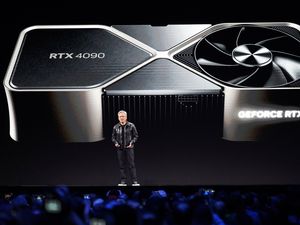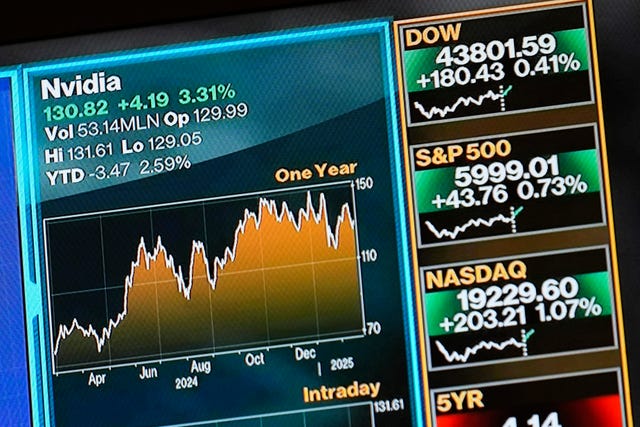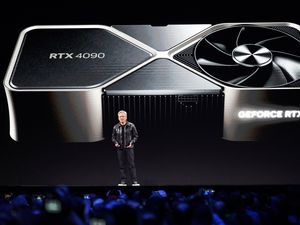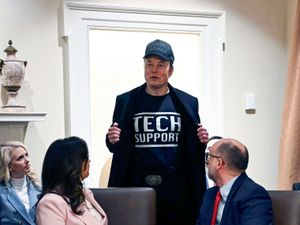Nvidia sales surge in the fourth quarter on demand for AI chips
The tech giant has ramped up the massive-scale production of Blackwell supercomputers.

Nvidia on Wednesday reported a surge in fourth-quarter profit and sales as demand for its specialised Blackwell chips, which power artificial intelligence (AI) systems, continued to grow, sending the company’s stock higher after hours.
For the three months that ended January 26, the tech giant based in Santa Clara, California, posted revenue of 39.3 billion dollars (£31 billion), up 12% from the previous quarter and 78% from one year ago.
“Demand for Blackwell is amazing as reasoning AI adds another scaling law — increasing compute for training makes models smarter and increasing compute for long thinking makes the answer smarter,” Nvidia founder Jensen Hufinanceang said in a statement.
Nvidia has ramped up the massive-scale production of Blackwell AI supercomputers, Mr Huang said, “achieving billions of dollars in sales in its first quarter”.

“AI is advancing at light speed as agentic AI and physical AI set the stage for the next wave of AI to revolutionise the largest industries,” he said.
Wednesday’s earnings report topped Wall Street expectations. Analysts had been expecting adjusted earnings of 85 cents a share on revenue of 38.1 billion dollars (£30 billion), according to FactSet.
Nvidia reported net income of 22.06 billion dollars (£17.4 billion) in the fourth quarter, beating analysts’ predictions of 19.57 billion dollars (£15.4 billion).
The tech giant expected sales to continue to grow, forecasting revenue of around 43 billion dollars (£33 billion) for the first quarter of fiscal 2026.
Data centre sales, which account for much of Nvidia’s revenues, were a core part of that uptick — fourth-quarter revenue was 35.6 billion dollars (£28 billion), up 93% from one year ago.
The growth in the data centre market comes as President Donald Trump has talked up a joint venture investing up to 500 billion dollars (£394.8 billion) for infrastructure tied to AI through a new partnership formed by OpenAI, Oracle and SoftBank.
The Stargate project will start building out data centres and the energy generation needed for the further development of AI, according to the White House.
Nvidia is a partner in that project.
On an earnings call on Wednesday afternoon, Nvidia chief financial officer Colette Kress said that fourth-quarter Blackwell sales exceeded the company’s expectations.
“We delivered 11 billion dollars (£8.6 billion) of Blackwell architecture revenue in the fourth quarter of fiscal 2025, the fastest product ramp in our company’s history,” Ms Kress said.
“Blackwell sales were led by large cloud service providers which represented approximately 50% of our data centre revenue.”
The poster child of the AI boom, Nvidia has grown into the second-largest company on Wall Street — it is now worth more than 3 trillion dollars (£2.37 trillion) — and the stock’s movement carries more weight on the S&P 500 and other indexes than every company except Apple.
Two years ago, Nvidia’s market value was below 600 billion dollars (£473.9 billion).
Nvidia and other companies benefiting from the AI boom have been a major reason the S&P 500 has climbed to record after record recently, with the latest coming last week.
Their explosion of profits has helped to propel the market despite worries about stubbornly high inflation and possible pain coming for the US economy from tariffs and other policies of US President Donald Trump.
But those tariffs are still “an unknown”, Ms Kress said, until Nvidia can better understand what the Trump administration’s plan is.
“We are awaiting,” she said, adding that the company would follow any export controls or tariff rules.
The fourth-quarter earnings are the company’s first report since Chinese company DeepSeek boasted it had developed a large language model that could compete with ChatGPT and other US rivals, but was more cost-effective in its use of Nvidia chips to train the system on troves of data.
The frenzy over DeepSeek caused 595 billion dollars (£474 billion) in Nvidia’s wealth to vanish briefly. But the company in a statement commended DeepSeek’s work as “an excellent AI advancement” that leveraged “widely-available models and compute that is fully export control compliant”.
“DeepSeek R1 has ignited global enthusiasm,” Mr Huang said on Wednesday’s earnings call. “It’s an excellent innovation, but even more importantly, it has open-sourced a world-class reasoning AI model.
Nearly every AI developer is applying R1, or chain of thought and reinforcement learning techniques like R1, to scale their models’ performance.”
Speaking to investors, Mr Huang said the “next wave” of AI is coming with “agentic AI for enterprise, physical AI for robotics and sovereign AI as the different regions build out their AI for their own ecosystems”.
“We’re in the centre of much of this development,” Mr Huang said.





